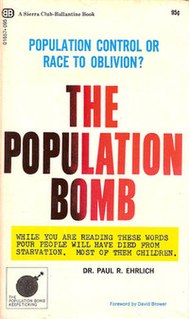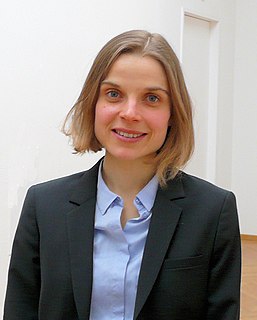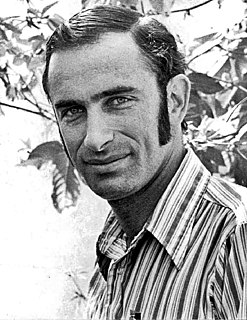This page is based on this
Wikipedia article Text is available under the
CC BY-SA 4.0 license; additional terms may apply.
Images, videos and audio are available under their respective licenses.

The Population Bomb is a best-selling book written by Stanford University Professor Paul R. Ehrlich and his wife, Anne Ehrlich, in 1968. It predicted worldwide famine in the 1970s and 1980s due to overpopulation, as well as other major societal upheavals, and advocated immediate action to limit population growth. Fears of a "population explosion" were widespread in the 1950s and 1960s, but the book and its author brought the idea to an even wider audience.

Julian Lincoln Simon was an American professor of business administration at the University of Maryland and a Senior Fellow at the Cato Institute at the time of his death, after previously serving as a longtime economics and business professor at the University of Illinois at Urbana-Champaign.
Albert Ludwig Sigesmund Neisser was a German physician who discovered the causative agent (pathogen) of gonorrhea, a strain of bacteria that was named in his honour.
Saul Paul Ehrlich Jr. was an American physician and public health administrator. He served as acting Surgeon General of the United States from 1973 to 1977.
Ehrlich is a German/Yiddish surname, meaning "honest" or "honorable". Notable people with the surname include:
Anne Howland Ehrlich is the American co-author of several books on overpopulation and ecology with her husband, Stanford University professor Paul R. Ehrlich. She is associate director of the Center for Conservation Biology at Stanford University.
Paul Henry de Kruif (1890–1971) was an American microbiologist and author of Dutch descent. Publishing as Paul de Kruif, he is most noted for his 1926 book, Microbe Hunters. This book was not only a bestseller for a lengthy period after publication, but has remained high on lists of recommended reading for science and has been an inspiration for many aspiring physicians and scientists.

Dr. Ehrlich's Magic Bullet is a 1940 biographical film directed by William Dieterle and starring Edward G. Robinson, based on the true story of the German doctor and scientist Dr. Paul Ehrlich. The film was released by Warner Bros., with some controversy considering the subject of syphilis in a major studio release. It was nominated for an Academy Award for its original screenplay, but lost to The Great McGinty.

Paul Guttmann was a German pathologist.
Max Michaelis Ehrlich was a German actor, screenwriter, and director on the German theater, comedy and cabaret scene of the 1930s.
Kenneth James "Ken" Ehrlich is an American television producer and director.
Alwin Max Pappenheimer Jr. was an American a biochemist and immunologist.

Hans Otto Friedrich Schlossberger was a German physician, who was known for his research in immunology, medical microbiology, epidemiology and antimicrobial chemotherapy, especially on syphilis, typhus, gas gangrene, diphtheria, erysipeloid of Rosenbach, tuberculosis, malaria and leptospirosis. He was one of the leading immunologists and bacteriologists of Germany during his lifetime, and was a student and collaborator of the Nobel laureates Paul Ehrlich and Emil von Behring, two of the principal founders of the field of immunology.

Christoph Bach is a German actor, living in Berlin. He was born in Reutlingen, and received his education at Universität der Künste in Berlin.

Richard Ernst Wilhelm Otto was a German physician and bacteriologist, who served as director of the Paul Ehrlich Institute until 1948.
John Foxton Ross Kerr is an Australian pathologist. He was the first to describe the ultrastructural changes in apoptosis, and could show that they differ significantly from the changes that occur in necrosis, another form of programmed cell death. For the first time, he placed the roles of cell death in normal adult mammals, and in disease, into scientific focus.

Andrea Ablasser is a German immunologist who works at the École Polytechnique Fédérale de Lausanne. Her research has focused on how the innate immune system is able to recognise virus-infected cells and pathogens.









